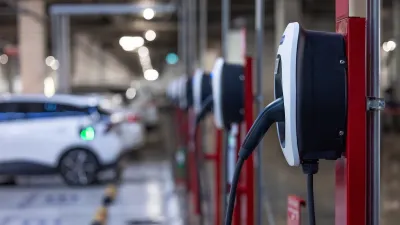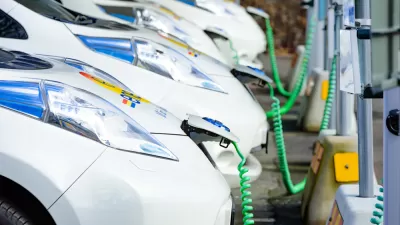A new UCLA study finds that while California has made progress in electric vehicle adoption, disadvantaged communities remain underserved in EV incentives, ownership, and charging access, requiring targeted policy changes to advance equity.

A new UCLA study finds that while California leads in zero-emission vehicle (ZEV) adoption and environmental justice goals, its clean vehicle incentive programs continue to fall short in equitably benefiting disadvantaged communities (DACs). Although Los Angeles County—home to over half of the state's DACs—has implemented initiatives like LADWP’s Powered by Equity and the city’s Green New Deal targets, significant disparities persist in EV ownership, incentive distribution, and public charging access. EV registration rates remain three times higher in non-DACs, and only 23% of LADWP’s EV incentive funding from 2013 to 2021 reached DACs, with most rebates benefiting wealthier, non-Hispanic white homeowners.
Beyond financial incentives, UCLA researchers identified a troubling gap in EV adoption and charging infrastructure availability. A related UCLA study revealed that ZEV ownership in non-DACs is nearly four times higher than in DACs, with racial and ethnic minorities owning fewer EVs regardless of income or location. While DAC residents experience greater air quality benefits from intercommunity ZEV trips, they remain disproportionately exposed to traffic-related air pollution due to limited access to EVs. Additionally, public charging stations are concentrated in higher-income areas, further restricting EV adoption in underserved neighborhoods. Case studies in Pacoima, South LA, Wilmington, and the Gateway Cities highlight extreme disparities in EV access, underscoring the need for stronger local, regional, and statewide efforts to close the equity gap.
To address these challenges, UCLA researchers recommend a significant policy shift, including increased funding for low-income EV incentive programs, improved financing options such as revolving loan funds, and stricter eligibility requirements to ensure clean vehicle incentives reach DACs. Expanding public EV charging infrastructure in disadvantaged areas and increasing transparency in investment decisions are also key steps toward achieving an equitable clean transportation transition. With Los Angeles playing a pivotal role in shaping California’s ZEV policies, its ability to close these equity gaps could set a model for nationwide clean energy solutions.
FULL STORY: Electric vehicle incentives, charging, and registration rates: Are we achieving equity in Los Angeles?

Trump Administration Could Effectively End Housing Voucher Program
Federal officials are eyeing major cuts to the Section 8 program that helps millions of low-income households pay rent.

Planetizen Federal Action Tracker
A weekly monitor of how Trump’s orders and actions are impacting planners and planning in America.

Ken Jennings Launches Transit Web Series
The Jeopardy champ wants you to ride public transit.

New Mexico Aging Department Commits to Helping Seniors Age ‘In Place’ and ‘Autonomously’ in New Draft Plan
As New Mexico’s population of seniors continues to grow, the state’s aging department is proposing expanded initiatives to help seniors maintain their autonomy while also supporting family caregivers.

USDOT Waters Down Self-Driving Car Regulations
The agency is reducing reporting requirements for autonomous vehicles and cars with self-driving features, prompting concern among safety advocates who say transparency is essential to the safe deployment of AV technology.

‘Minnesota Nice’ Isn’t so Nice When You Can’t Find a Place to Live
The Economic Development and Housing Challenge Program can help address the scourge of homelessness among Indigenous people.
Urban Design for Planners 1: Software Tools
This six-course series explores essential urban design concepts using open source software and equips planners with the tools they need to participate fully in the urban design process.
Planning for Universal Design
Learn the tools for implementing Universal Design in planning regulations.
Heyer Gruel & Associates PA
Ada County Highway District
Institute for Housing and Urban Development Studies (IHS)
City of Grandview
Harvard GSD Executive Education
Toledo-Lucas County Plan Commissions
Salt Lake City
NYU Wagner Graduate School of Public Service





























